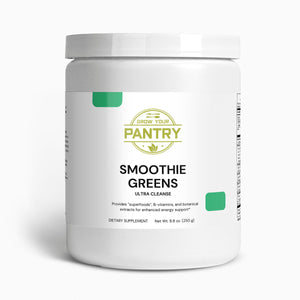Kombucha For Weight Loss: Does It Work?
Does kombucha help weight loss? Potentially, kombucha tea contains some micronutrients which aid in weight control. These are gained from the tea leaves.
Not Much Time? Skip To What You'd Like To Learn...
-
The Claim Of Kobucha Aiding Weight Loss
-
What Causes Kombucha To Cause Weight Loss?
-
Tea's Impact On Weight Loss
-
Kombucha Nutritional Information
-
Homebrew vs Store-Bought
-
What To Look For When Buying Kombucha At The Store
-
Kombucha Workout Recovery
-
Side Effects Of Drinking Kombucha
-
FAQs
The Claim Of Kobucha Aiding Weight Loss

Is there any science behind it?
Some, while kombucha's antibacterial properties and benefits are easily proved, it's an entirely different thing when it comes to its role in weight loss. There is not a considerable amount of research available. Although, kombucha tea has been shown to have similar weight control properties that are attributed to tea (one of the main ingredients).
As some varieties of kombucha are made from green tea, they presumably contain similar benefits, including calorie burning.
There is also studies and research which show the correlation between fermented foods and the increase in metabolism, which therefore induces weight loss.
It's important to note that research is still ongoing on the long-term effects of some of the compounds and probiotics and how they interact with the gut system. (link)
How often should I drink kombucha?
It depends. The FDA recommend 4oz (110ml) per day is safe to drink. However, this will be influenced by the number of calories, caffeine, and sugar in it. Each store-bought and homebrew bottle will have varying amounts.
It is essential to find the unique balance for your body to reap the health benefits without having any impact on your daily intake allowances.
What Causes Kombucha To Cause Weight Loss?

During fermentation kombucha produces probiotic bacteria. A certain amount of probiotics can affect the metabolism rate, which regulates how fast you gain or lose weight. Although, currently there has been little research to confirm the probiotic level and benefits of kombucha specifically.
Other Factors Which Aid Weight Loss:
Probiotics Count
Before we get into this, it's worth mentioning that research on probiotics is limited. It's been noted that fermented products such as kombucha contain probiotics which can help shed body fat.
Hormone imbalance is often linked to uncontrolled weight gain. This is where the probiotics in kombucha come in; a single glass of kombucha contains more than a billion of these useful probiotics. One of their roles includes regulating hormone balance to keep everything balanced, thus leading to weight control (link).
Sugar Content
An 8 oz (227ml) serving of kombucha should contain 2 to 6g of sugar. During the preparation process, the tea requires around 50 to 100g of sugar per 35oz (1 liter). The yeast feeds on sugar during fermentation, and most of the sugar gets converted into carbon dioxide and alcohol, which is in turn broken down by the bacteria culture.
Kombucha has fewer calories compared to fizzy drinks. An 8 oz (227ml) helping with will keep you energized for hours while still feeling satiated and hydrated. This cuts down on the urge to eat more frequently, making it much easier to control weight.
Metabolism
Consuming kombucha has a direct impact on your metabolic rate, which leads to increased fat burn. This is all due to the probiotics in the drink (link).
Appetite Suppressant
Kombucha is considered a natural appetite suppressant due to its fizzy nature. After drinking kombucha you will feel full. The carbohydrates in kombucha are then slowly digested and absorbed into your bloodstream, keeping your sugar levels constant, which further suppresses the need to eat.
Tea's Impact On Weight Loss

Green Tea
Rich in natural antioxidants such as catechins which help in boosting metabolism and thus increased fat burn.
Black Tea
Contains polyphenols which are believed to block absorption of fat in the small intestine thus helping out in your weightloss activities.
Rich in flavones which are antioxidants that has been shown to increase fat breakdown and continued reduction in BMI.
White Tea
White tea extract has been shown to result in increased fat burning and a reduction in the creation of new fat cells.
Oolong Tea
Increases fat metabolism as well as overall energy expenditure within the body leading to weight loss.
Our Teas Of Choice
Black Tea

The Ying Yang Blend is the perfect choice for brewing kombucha tea. It contains both white and black tea for getting the best tasting blend.
[Check The Latest Price On Amazon By Clicking
This Link]
Green Tea
 Super Green is our green tea of choice for brewing kombucha. For its tastes, purported health benefits and energy boosting properties.
Super Green is our green tea of choice for brewing kombucha. For its tastes, purported health benefits and energy boosting properties.
[Check The Latest Price On Amazon By Clicking
This Link]
Blended Tea

Therefore we would recommend Get Kombucha's blend which has many positive reviews and feedback. Also tastes great! Blends of tea are difficult to produce yourself. When blending teas for kombucha it's important to not create a blend that contains natural oils or other ingredients which can spoil your batch.
[Check The Latest Price On Amazon By Clicking
This Link]
Kombucha Nutritional Information

See the table below which includes information of approximate nutrients in kombucha. The amount can vary from brand to brand, and recipe to recipe so always check the label.
Average In 8oz Of Store Bought |
Average In 8oz Of Homebrewed From Green Tea |
Average In 8oz Of Homebrewed From Black Tea |
Average In 8oz Of Homebrewed From White Tea |
|
Calories |
32-96 |
20 |
14 |
19 |
Sugar |
8-24g |
3g |
2.1g |
3g |
Caffeine |
4-40mg |
35-70mg |
60-90mg |
30-55mg |
Saturated Fat |
0g |
0.9g |
0.6g |
0.9g |
Sodium |
10mg |
5mg |
5mg |
5mg |
-
Calories
Kombucha contains sugar and fat lipids which together provide calories (varying between brands). While there is still sugar after fermentation, it is considered a low-calorie drink.
-
Sodium
Kombucha contains sodium which is an essential electrolyte in the body. Sodium regulates the amount of water in the cells. An 8 oz (227ml) kombucha drink contains between 5mg and 12mg of sodium. This is lower than the recommended daily limit of 1500mg per day.
-
Acetic Acid
Kombucha contains at least 1% acetic acid per volume, an 8 oz (227ml) drink would have 0.4mg acetic acid. The acid is produced by the breakdown of sugars during fermentation before getting broken down to alcohol. Acetic acid helps in reducing inflammation and lowering blood sugar spikes.
-
Caffeine
An 8oz kombucha serving contains anywhere between 4mg to 70mg of caffeine. While caffeine is known for its addictiveness and side effects, its low concentration in kombucha makes it the perfect way to consume caffeine. Caffeine helps in improving energy levels as well as physical performance. Check out our article How Much Caffeine In Kombucha for more information.
-
Vitamins
Some vitamins from the tea survive the fermentation process, others are produced during the breakdown of sugars by the yeast. Kombucha contains trace amounts of vitamins B12, B6, and vitamin C.
-
Antioxidants
Kombucha prepared from green tea is especially rich in polyphenols. These are a group of antioxidants that protect your body from free radicals which cause oxidative damage.
Homebrew vs Store-Bought

Store-bought kombucha is considered to have a higher calorie count compared to homebrewed kombucha. This marginal difference is also seen in other micronutrients such as caffeine and saturated fats, as seen in the table above.
Contains helpful probiotics
Homebrew: Will depend on the fermentation length
Store-bought: Controlled during the bottling process
Commercially brewed kombucha often prides itself in providing billions of probiotics in a bottle. Most commercial brewers rely on pasteurization to preserve kombucha while bottled. This process kills probiotics, and even if the company may add additional probiotics before sealing, it's still much lower than natural amounts of probiotics in homebrewed kombucha.
Homebrewed kombucha contains more probiotics than store-bought kombucha due to the preservation technique employed during bottling. As a result, it has a more noticeable effect on your weight control efforts.
Low calorie
Homebrew: 12-24 calories per 8 oz (227ml)
Store-bought: 34-70 calories per 8 oz (227ml), depending on the brand
According to law, a drink can only be termed to be low calorie if it contains less than 2.5 calories per 100ml. This is more moderate than the actual calorie count of most store-bought kombucha brands. To avoid negatively impacting your weight loss, always check the exact amount of calories in store-bought kombucha even if it's marketed as a low-calorie drink.
Caffeine
Homebrew: 35-70mg per 8 oz (227ml)
Store-bought: 8-14mg per 8 oz (227ml)
Some people often experience adverse effects after consuming caffeine. As a result, there's been a lot of marketing for the so-called decaf kombucha. However, in truth, there's no way to remove caffeine from regular tea leaves, so the next alternative is to use herbal instead. However, the downside of eliminating caffeine is that you will no longer get the benefits associated with caffeine's influence on metabolism and weight loss.
What To Look For When Buying Kombucha At The Store

Sugar Level
There is quite a range of kombucha drinks available ranging in sugar levels, always go kombucha with less than 5g sugar per serving. The lower the sugar, the more beneficial for weight loss.
Presence Of Supplements
Avoid kombucha drinks that have been 'boosted' with supplements. This is an indication that the kombucha has not been brewed naturally or its probiotic count has been altered. This happens during pasteurization, opt for brands that sell raw kombucha.
Ingredients List
Kombucha should be brewed using only four ingredients: Water, tea leaves, sugar, and a starter culture.
Kombucha Workout Recovery

Kombucha is the ideal drink for workout recovery thanks to its unique constituents. This is because, after a workout, your body requires to recover the nutrients and water lost during the activity.
Benefits:
Electrolyte replacement
Kombucha rehydrates the body after a sweaty workout. The sodium electrolytes quickly restore the water balance within the body.
Removal of toxins
During exercise, your body quickly builds up toxic chemicals and free radicals within the muscle cells. These need to be oxidized before they do any real harm to the cells. Kombucha is packed with antioxidant probiotics. These work hand in hand with glucuronic acid to battle toxins in the body.
Joint protection
After heavy exercise, your joints need to recover. The tissue damage is reversed as the joints repair, and it can take quite some time. It's recommended to comsume glucosamine and glucuronic acid to enhance this process. Both of which are found in trace amounts in kombucha.
Is kombucha good for pre-workout?
Kombucha is not recommended for pre-workout drinking due to its natural carbonation. The gas may result in an unsettled stomach during the workout, which is slightly uncomfortable.
Side Effects Of Drinking Kombucha

May result in digestive issues and bloating
The introduction of probiotics to the gut ecosystem may lead to disruptions which result in side effects such as gastrointestinal distress. The carbon dioxide that's found in kombucha also causes excess gas and bloating, which is not only uncomfortable but can also lead to diarrhea.
May weaken compromised immune systems
People with a compromised immune system that's already weak, such as HIV and cancer patients may develop more complications arising from the consumption of kombucha. The opportunistic bacteria and yeast in kombucha might be too strong for the immune system leading to severe infections.
Could lead to caffeine driven anxiety
If you are prone to anxiety attacks as a result of caffeine consumption, then kombucha might not be the drink for you. Although it does contain less caffeine, it's still possible to experience the adverse effects.
May affect blood sugar levels
People with diabetes are more likely to experience hypoglycemia which results in low blood sugar after consuming kombucha. To avoid such complications, carefully monitor blood sugar levels.
May lead to excessive calorie intake
While kombucha can help in losing weight, overconsumption can have the opposite effect. This is because kombucha still does contain carbs, and these may accumulate in the body if you consume too much kombucha, which will cause you to put on more weight.
FAQs

How much kombucha can you drink in a day?
It depends, this will be influenced by the number of calories as well as caffeine concentration.
Can I drink kombucha every day?
Yes.
Does kombucha increase metabolism?
Yes, kombucha has been shown to trigger increased metabolism after consumption.
Does kombucha give you a flat stomach?
Not really, while kombucha does contribute to loss of body fat, it takes a combined effort in dieting habits and regular exercise to get a 'flat stomach'.








I will love to try yhis